The Notion of Copyrights is Obsolete and Requires the Development of New Laws
VerifiedAdded on 2023/06/04
|10
|2615
|337
AI Summary
This article discusses the need for new copyright laws in the digital age as the existing laws have become obsolete. It highlights the reasons why the copyright laws need to be changed and the benefits of developing new laws.
Contribute Materials
Your contribution can guide someone’s learning journey. Share your
documents today.
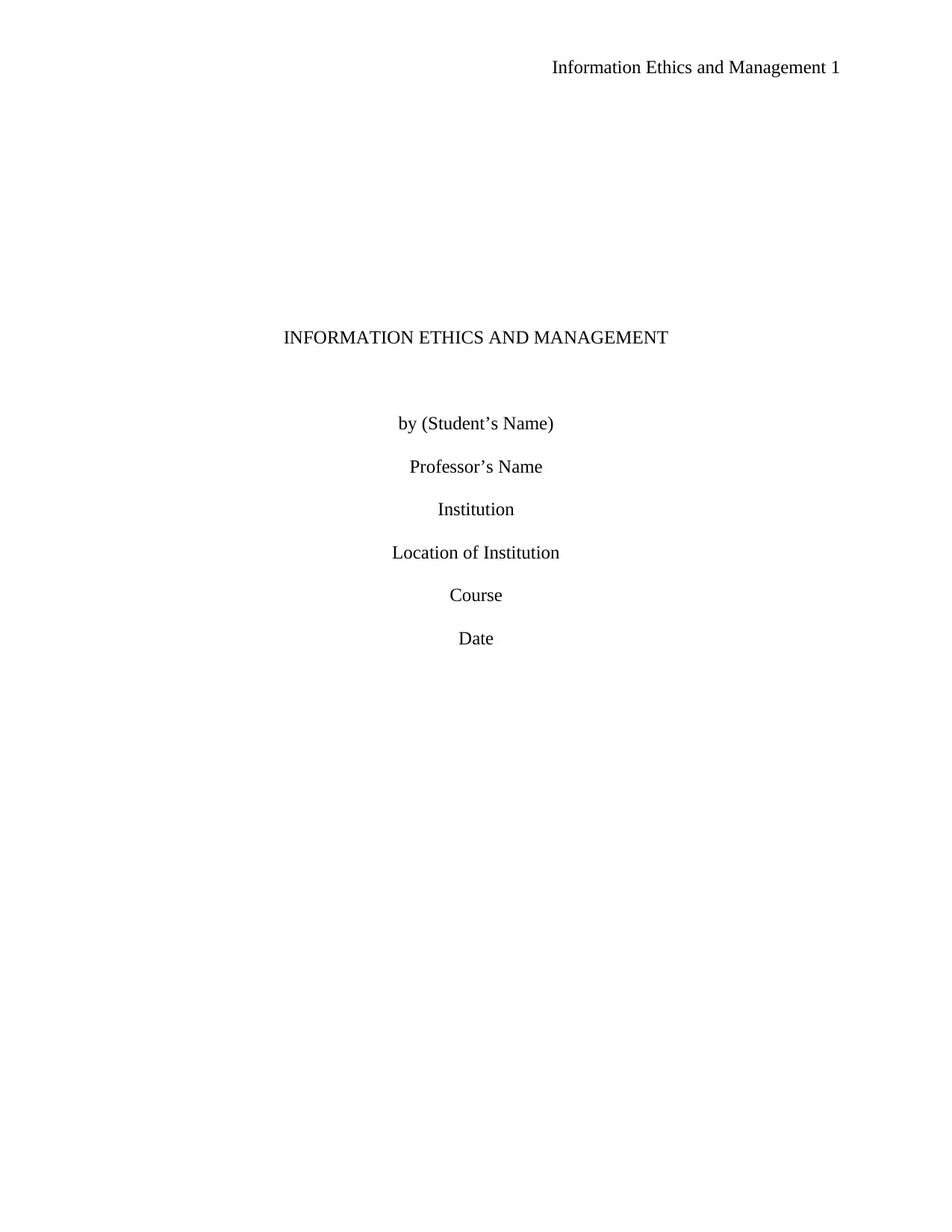
Information Ethics and Management 1
INFORMATION ETHICS AND MANAGEMENT
by (Student’s Name)
Professor’s Name
Institution
Location of Institution
Course
Date
INFORMATION ETHICS AND MANAGEMENT
by (Student’s Name)
Professor’s Name
Institution
Location of Institution
Course
Date
Secure Best Marks with AI Grader
Need help grading? Try our AI Grader for instant feedback on your assignments.
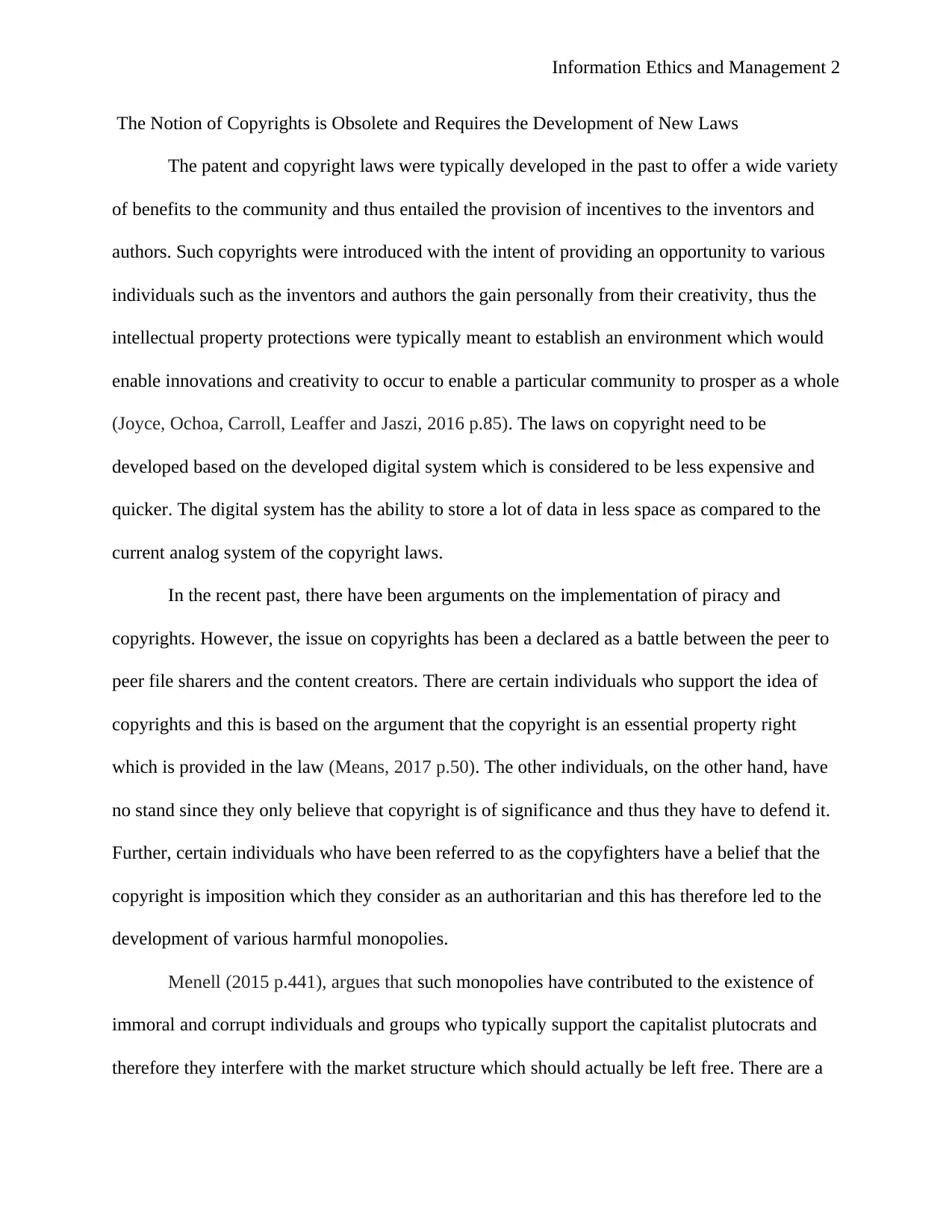
Information Ethics and Management 2
The Notion of Copyrights is Obsolete and Requires the Development of New Laws
The patent and copyright laws were typically developed in the past to offer a wide variety
of benefits to the community and thus entailed the provision of incentives to the inventors and
authors. Such copyrights were introduced with the intent of providing an opportunity to various
individuals such as the inventors and authors the gain personally from their creativity, thus the
intellectual property protections were typically meant to establish an environment which would
enable innovations and creativity to occur to enable a particular community to prosper as a whole
(Joyce, Ochoa, Carroll, Leaffer and Jaszi, 2016 p.85). The laws on copyright need to be
developed based on the developed digital system which is considered to be less expensive and
quicker. The digital system has the ability to store a lot of data in less space as compared to the
current analog system of the copyright laws.
In the recent past, there have been arguments on the implementation of piracy and
copyrights. However, the issue on copyrights has been a declared as a battle between the peer to
peer file sharers and the content creators. There are certain individuals who support the idea of
copyrights and this is based on the argument that the copyright is an essential property right
which is provided in the law (Means, 2017 p.50). The other individuals, on the other hand, have
no stand since they only believe that copyright is of significance and thus they have to defend it.
Further, certain individuals who have been referred to as the copyfighters have a belief that the
copyright is imposition which they consider as an authoritarian and this has therefore led to the
development of various harmful monopolies.
Menell (2015 p.441), argues that such monopolies have contributed to the existence of
immoral and corrupt individuals and groups who typically support the capitalist plutocrats and
therefore they interfere with the market structure which should actually be left free. There are a
The Notion of Copyrights is Obsolete and Requires the Development of New Laws
The patent and copyright laws were typically developed in the past to offer a wide variety
of benefits to the community and thus entailed the provision of incentives to the inventors and
authors. Such copyrights were introduced with the intent of providing an opportunity to various
individuals such as the inventors and authors the gain personally from their creativity, thus the
intellectual property protections were typically meant to establish an environment which would
enable innovations and creativity to occur to enable a particular community to prosper as a whole
(Joyce, Ochoa, Carroll, Leaffer and Jaszi, 2016 p.85). The laws on copyright need to be
developed based on the developed digital system which is considered to be less expensive and
quicker. The digital system has the ability to store a lot of data in less space as compared to the
current analog system of the copyright laws.
In the recent past, there have been arguments on the implementation of piracy and
copyrights. However, the issue on copyrights has been a declared as a battle between the peer to
peer file sharers and the content creators. There are certain individuals who support the idea of
copyrights and this is based on the argument that the copyright is an essential property right
which is provided in the law (Means, 2017 p.50). The other individuals, on the other hand, have
no stand since they only believe that copyright is of significance and thus they have to defend it.
Further, certain individuals who have been referred to as the copyfighters have a belief that the
copyright is imposition which they consider as an authoritarian and this has therefore led to the
development of various harmful monopolies.
Menell (2015 p.441), argues that such monopolies have contributed to the existence of
immoral and corrupt individuals and groups who typically support the capitalist plutocrats and
therefore they interfere with the market structure which should actually be left free. There are a
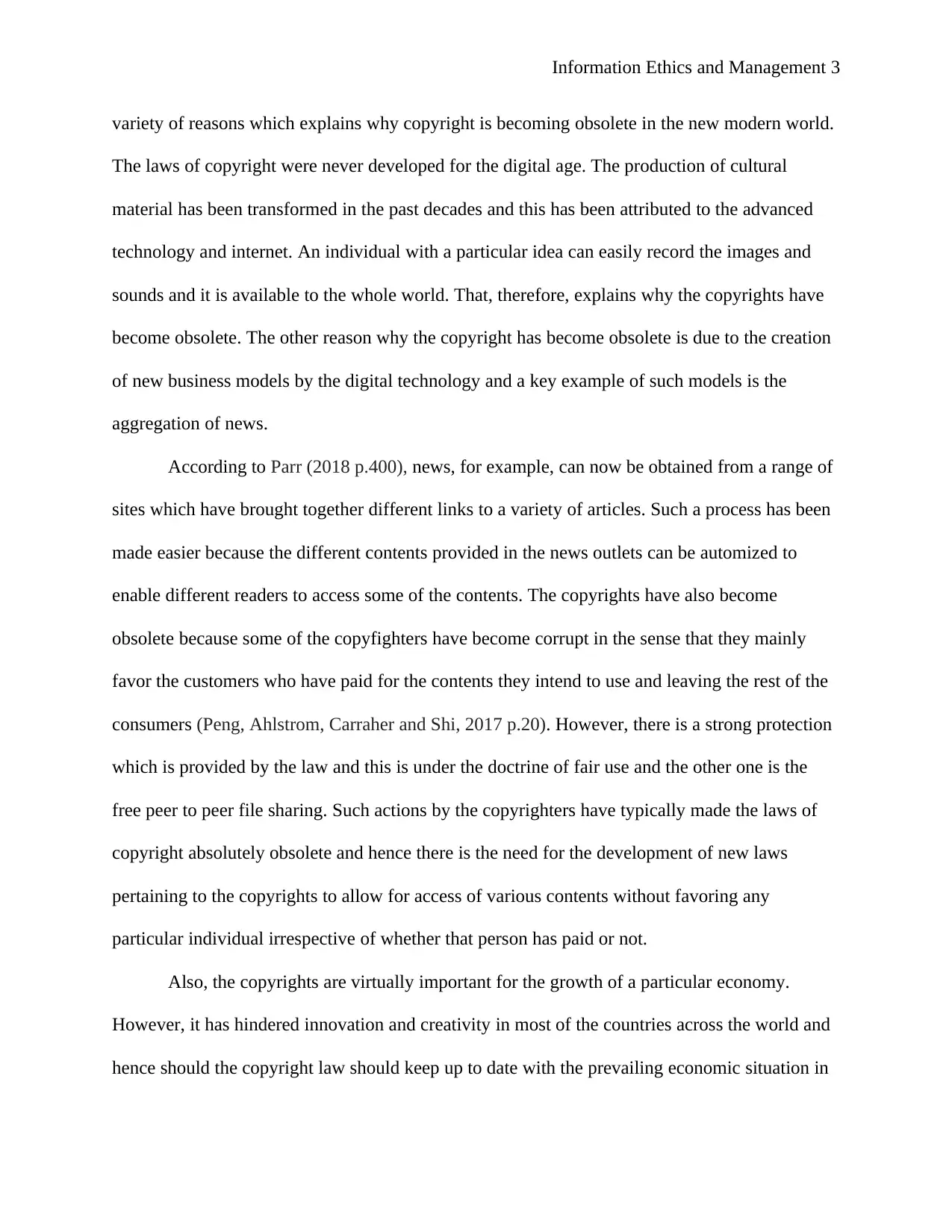
Information Ethics and Management 3
variety of reasons which explains why copyright is becoming obsolete in the new modern world.
The laws of copyright were never developed for the digital age. The production of cultural
material has been transformed in the past decades and this has been attributed to the advanced
technology and internet. An individual with a particular idea can easily record the images and
sounds and it is available to the whole world. That, therefore, explains why the copyrights have
become obsolete. The other reason why the copyright has become obsolete is due to the creation
of new business models by the digital technology and a key example of such models is the
aggregation of news.
According to Parr (2018 p.400), news, for example, can now be obtained from a range of
sites which have brought together different links to a variety of articles. Such a process has been
made easier because the different contents provided in the news outlets can be automized to
enable different readers to access some of the contents. The copyrights have also become
obsolete because some of the copyfighters have become corrupt in the sense that they mainly
favor the customers who have paid for the contents they intend to use and leaving the rest of the
consumers (Peng, Ahlstrom, Carraher and Shi, 2017 p.20). However, there is a strong protection
which is provided by the law and this is under the doctrine of fair use and the other one is the
free peer to peer file sharing. Such actions by the copyrighters have typically made the laws of
copyright absolutely obsolete and hence there is the need for the development of new laws
pertaining to the copyrights to allow for access of various contents without favoring any
particular individual irrespective of whether that person has paid or not.
Also, the copyrights are virtually important for the growth of a particular economy.
However, it has hindered innovation and creativity in most of the countries across the world and
hence should the copyright law should keep up to date with the prevailing economic situation in
variety of reasons which explains why copyright is becoming obsolete in the new modern world.
The laws of copyright were never developed for the digital age. The production of cultural
material has been transformed in the past decades and this has been attributed to the advanced
technology and internet. An individual with a particular idea can easily record the images and
sounds and it is available to the whole world. That, therefore, explains why the copyrights have
become obsolete. The other reason why the copyright has become obsolete is due to the creation
of new business models by the digital technology and a key example of such models is the
aggregation of news.
According to Parr (2018 p.400), news, for example, can now be obtained from a range of
sites which have brought together different links to a variety of articles. Such a process has been
made easier because the different contents provided in the news outlets can be automized to
enable different readers to access some of the contents. The copyrights have also become
obsolete because some of the copyfighters have become corrupt in the sense that they mainly
favor the customers who have paid for the contents they intend to use and leaving the rest of the
consumers (Peng, Ahlstrom, Carraher and Shi, 2017 p.20). However, there is a strong protection
which is provided by the law and this is under the doctrine of fair use and the other one is the
free peer to peer file sharing. Such actions by the copyrighters have typically made the laws of
copyright absolutely obsolete and hence there is the need for the development of new laws
pertaining to the copyrights to allow for access of various contents without favoring any
particular individual irrespective of whether that person has paid or not.
Also, the copyrights are virtually important for the growth of a particular economy.
However, it has hindered innovation and creativity in most of the countries across the world and
hence should the copyright law should keep up to date with the prevailing economic situation in
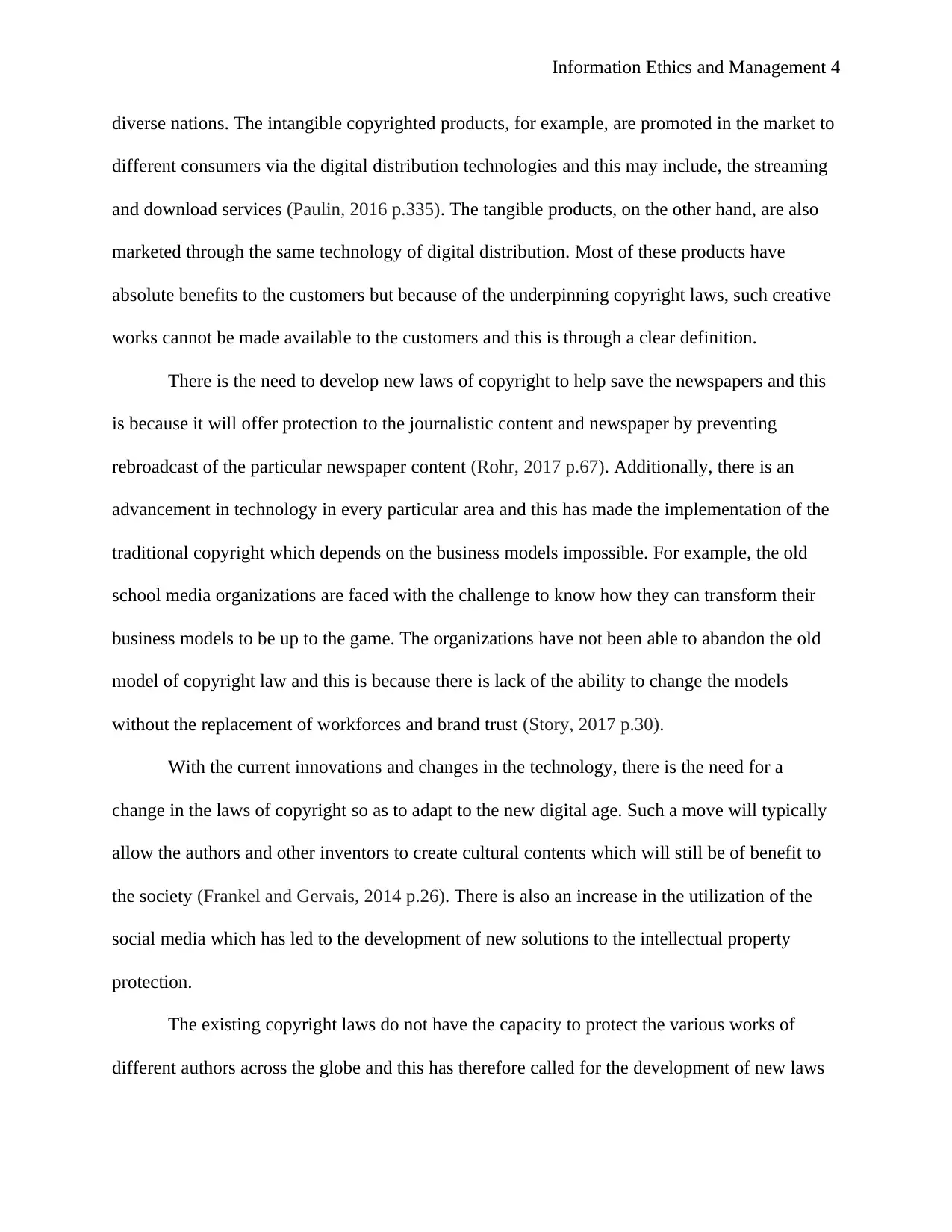
Information Ethics and Management 4
diverse nations. The intangible copyrighted products, for example, are promoted in the market to
different consumers via the digital distribution technologies and this may include, the streaming
and download services (Paulin, 2016 p.335). The tangible products, on the other hand, are also
marketed through the same technology of digital distribution. Most of these products have
absolute benefits to the customers but because of the underpinning copyright laws, such creative
works cannot be made available to the customers and this is through a clear definition.
There is the need to develop new laws of copyright to help save the newspapers and this
is because it will offer protection to the journalistic content and newspaper by preventing
rebroadcast of the particular newspaper content (Rohr, 2017 p.67). Additionally, there is an
advancement in technology in every particular area and this has made the implementation of the
traditional copyright which depends on the business models impossible. For example, the old
school media organizations are faced with the challenge to know how they can transform their
business models to be up to the game. The organizations have not been able to abandon the old
model of copyright law and this is because there is lack of the ability to change the models
without the replacement of workforces and brand trust (Story, 2017 p.30).
With the current innovations and changes in the technology, there is the need for a
change in the laws of copyright so as to adapt to the new digital age. Such a move will typically
allow the authors and other inventors to create cultural contents which will still be of benefit to
the society (Frankel and Gervais, 2014 p.26). There is also an increase in the utilization of the
social media which has led to the development of new solutions to the intellectual property
protection.
The existing copyright laws do not have the capacity to protect the various works of
different authors across the globe and this has therefore called for the development of new laws
diverse nations. The intangible copyrighted products, for example, are promoted in the market to
different consumers via the digital distribution technologies and this may include, the streaming
and download services (Paulin, 2016 p.335). The tangible products, on the other hand, are also
marketed through the same technology of digital distribution. Most of these products have
absolute benefits to the customers but because of the underpinning copyright laws, such creative
works cannot be made available to the customers and this is through a clear definition.
There is the need to develop new laws of copyright to help save the newspapers and this
is because it will offer protection to the journalistic content and newspaper by preventing
rebroadcast of the particular newspaper content (Rohr, 2017 p.67). Additionally, there is an
advancement in technology in every particular area and this has made the implementation of the
traditional copyright which depends on the business models impossible. For example, the old
school media organizations are faced with the challenge to know how they can transform their
business models to be up to the game. The organizations have not been able to abandon the old
model of copyright law and this is because there is lack of the ability to change the models
without the replacement of workforces and brand trust (Story, 2017 p.30).
With the current innovations and changes in the technology, there is the need for a
change in the laws of copyright so as to adapt to the new digital age. Such a move will typically
allow the authors and other inventors to create cultural contents which will still be of benefit to
the society (Frankel and Gervais, 2014 p.26). There is also an increase in the utilization of the
social media which has led to the development of new solutions to the intellectual property
protection.
The existing copyright laws do not have the capacity to protect the various works of
different authors across the globe and this has therefore called for the development of new laws
Secure Best Marks with AI Grader
Need help grading? Try our AI Grader for instant feedback on your assignments.
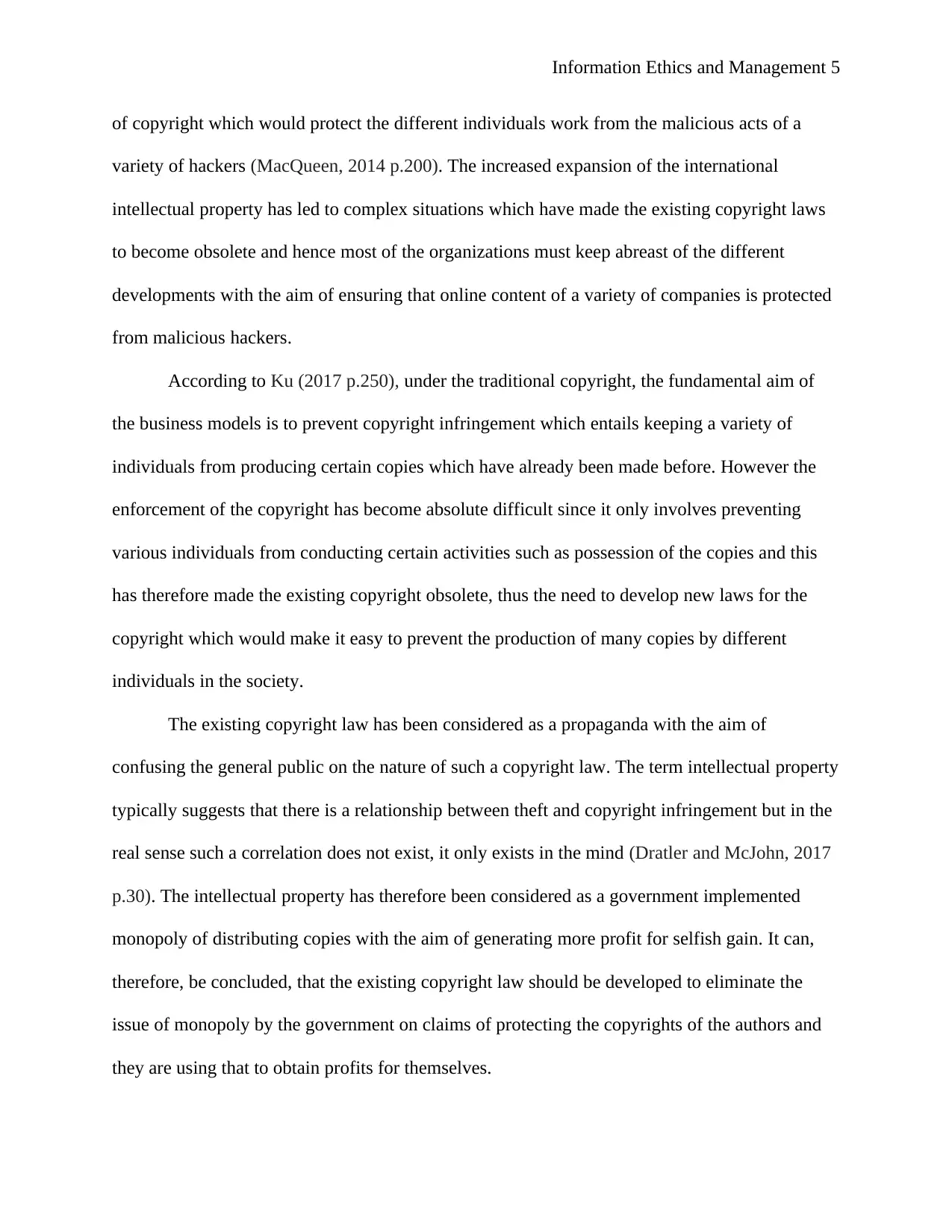
Information Ethics and Management 5
of copyright which would protect the different individuals work from the malicious acts of a
variety of hackers (MacQueen, 2014 p.200). The increased expansion of the international
intellectual property has led to complex situations which have made the existing copyright laws
to become obsolete and hence most of the organizations must keep abreast of the different
developments with the aim of ensuring that online content of a variety of companies is protected
from malicious hackers.
According to Ku (2017 p.250), under the traditional copyright, the fundamental aim of
the business models is to prevent copyright infringement which entails keeping a variety of
individuals from producing certain copies which have already been made before. However the
enforcement of the copyright has become absolute difficult since it only involves preventing
various individuals from conducting certain activities such as possession of the copies and this
has therefore made the existing copyright obsolete, thus the need to develop new laws for the
copyright which would make it easy to prevent the production of many copies by different
individuals in the society.
The existing copyright law has been considered as a propaganda with the aim of
confusing the general public on the nature of such a copyright law. The term intellectual property
typically suggests that there is a relationship between theft and copyright infringement but in the
real sense such a correlation does not exist, it only exists in the mind (Dratler and McJohn, 2017
p.30). The intellectual property has therefore been considered as a government implemented
monopoly of distributing copies with the aim of generating more profit for selfish gain. It can,
therefore, be concluded, that the existing copyright law should be developed to eliminate the
issue of monopoly by the government on claims of protecting the copyrights of the authors and
they are using that to obtain profits for themselves.
of copyright which would protect the different individuals work from the malicious acts of a
variety of hackers (MacQueen, 2014 p.200). The increased expansion of the international
intellectual property has led to complex situations which have made the existing copyright laws
to become obsolete and hence most of the organizations must keep abreast of the different
developments with the aim of ensuring that online content of a variety of companies is protected
from malicious hackers.
According to Ku (2017 p.250), under the traditional copyright, the fundamental aim of
the business models is to prevent copyright infringement which entails keeping a variety of
individuals from producing certain copies which have already been made before. However the
enforcement of the copyright has become absolute difficult since it only involves preventing
various individuals from conducting certain activities such as possession of the copies and this
has therefore made the existing copyright obsolete, thus the need to develop new laws for the
copyright which would make it easy to prevent the production of many copies by different
individuals in the society.
The existing copyright law has been considered as a propaganda with the aim of
confusing the general public on the nature of such a copyright law. The term intellectual property
typically suggests that there is a relationship between theft and copyright infringement but in the
real sense such a correlation does not exist, it only exists in the mind (Dratler and McJohn, 2017
p.30). The intellectual property has therefore been considered as a government implemented
monopoly of distributing copies with the aim of generating more profit for selfish gain. It can,
therefore, be concluded, that the existing copyright law should be developed to eliminate the
issue of monopoly by the government on claims of protecting the copyrights of the authors and
they are using that to obtain profits for themselves.
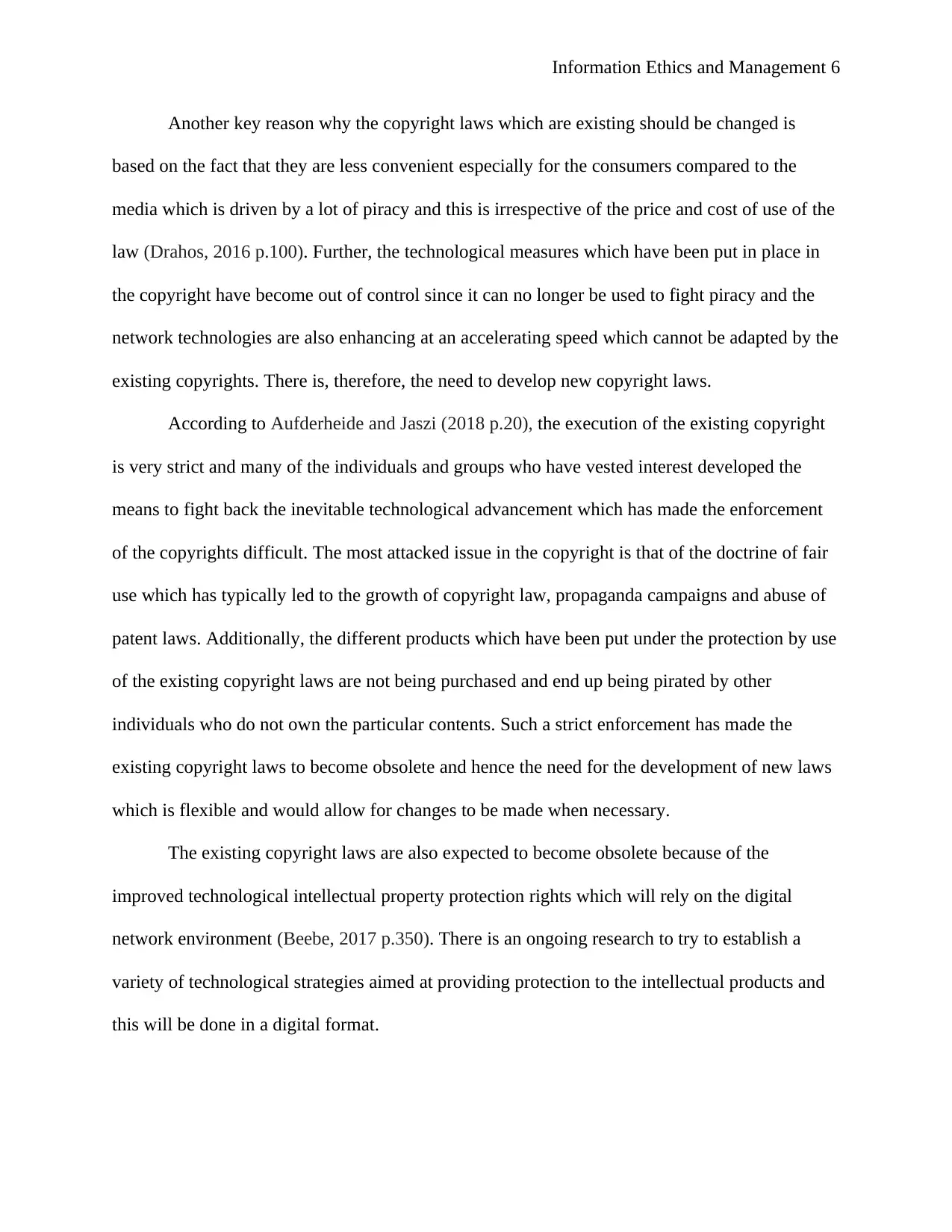
Information Ethics and Management 6
Another key reason why the copyright laws which are existing should be changed is
based on the fact that they are less convenient especially for the consumers compared to the
media which is driven by a lot of piracy and this is irrespective of the price and cost of use of the
law (Drahos, 2016 p.100). Further, the technological measures which have been put in place in
the copyright have become out of control since it can no longer be used to fight piracy and the
network technologies are also enhancing at an accelerating speed which cannot be adapted by the
existing copyrights. There is, therefore, the need to develop new copyright laws.
According to Aufderheide and Jaszi (2018 p.20), the execution of the existing copyright
is very strict and many of the individuals and groups who have vested interest developed the
means to fight back the inevitable technological advancement which has made the enforcement
of the copyrights difficult. The most attacked issue in the copyright is that of the doctrine of fair
use which has typically led to the growth of copyright law, propaganda campaigns and abuse of
patent laws. Additionally, the different products which have been put under the protection by use
of the existing copyright laws are not being purchased and end up being pirated by other
individuals who do not own the particular contents. Such a strict enforcement has made the
existing copyright laws to become obsolete and hence the need for the development of new laws
which is flexible and would allow for changes to be made when necessary.
The existing copyright laws are also expected to become obsolete because of the
improved technological intellectual property protection rights which will rely on the digital
network environment (Beebe, 2017 p.350). There is an ongoing research to try to establish a
variety of technological strategies aimed at providing protection to the intellectual products and
this will be done in a digital format.
Another key reason why the copyright laws which are existing should be changed is
based on the fact that they are less convenient especially for the consumers compared to the
media which is driven by a lot of piracy and this is irrespective of the price and cost of use of the
law (Drahos, 2016 p.100). Further, the technological measures which have been put in place in
the copyright have become out of control since it can no longer be used to fight piracy and the
network technologies are also enhancing at an accelerating speed which cannot be adapted by the
existing copyrights. There is, therefore, the need to develop new copyright laws.
According to Aufderheide and Jaszi (2018 p.20), the execution of the existing copyright
is very strict and many of the individuals and groups who have vested interest developed the
means to fight back the inevitable technological advancement which has made the enforcement
of the copyrights difficult. The most attacked issue in the copyright is that of the doctrine of fair
use which has typically led to the growth of copyright law, propaganda campaigns and abuse of
patent laws. Additionally, the different products which have been put under the protection by use
of the existing copyright laws are not being purchased and end up being pirated by other
individuals who do not own the particular contents. Such a strict enforcement has made the
existing copyright laws to become obsolete and hence the need for the development of new laws
which is flexible and would allow for changes to be made when necessary.
The existing copyright laws are also expected to become obsolete because of the
improved technological intellectual property protection rights which will rely on the digital
network environment (Beebe, 2017 p.350). There is an ongoing research to try to establish a
variety of technological strategies aimed at providing protection to the intellectual products and
this will be done in a digital format.
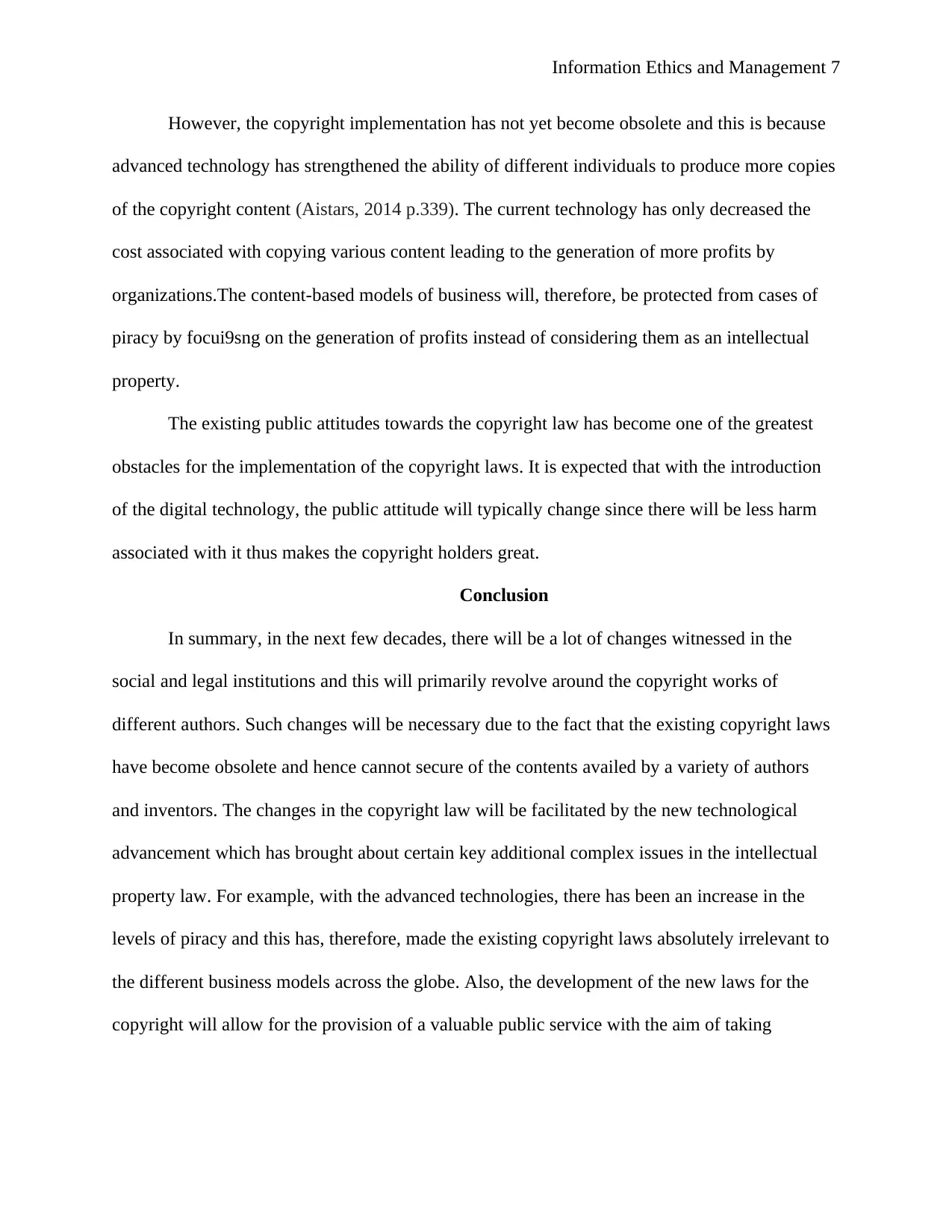
Information Ethics and Management 7
However, the copyright implementation has not yet become obsolete and this is because
advanced technology has strengthened the ability of different individuals to produce more copies
of the copyright content (Aistars, 2014 p.339). The current technology has only decreased the
cost associated with copying various content leading to the generation of more profits by
organizations.The content-based models of business will, therefore, be protected from cases of
piracy by focui9sng on the generation of profits instead of considering them as an intellectual
property.
The existing public attitudes towards the copyright law has become one of the greatest
obstacles for the implementation of the copyright laws. It is expected that with the introduction
of the digital technology, the public attitude will typically change since there will be less harm
associated with it thus makes the copyright holders great.
Conclusion
In summary, in the next few decades, there will be a lot of changes witnessed in the
social and legal institutions and this will primarily revolve around the copyright works of
different authors. Such changes will be necessary due to the fact that the existing copyright laws
have become obsolete and hence cannot secure of the contents availed by a variety of authors
and inventors. The changes in the copyright law will be facilitated by the new technological
advancement which has brought about certain key additional complex issues in the intellectual
property law. For example, with the advanced technologies, there has been an increase in the
levels of piracy and this has, therefore, made the existing copyright laws absolutely irrelevant to
the different business models across the globe. Also, the development of the new laws for the
copyright will allow for the provision of a valuable public service with the aim of taking
However, the copyright implementation has not yet become obsolete and this is because
advanced technology has strengthened the ability of different individuals to produce more copies
of the copyright content (Aistars, 2014 p.339). The current technology has only decreased the
cost associated with copying various content leading to the generation of more profits by
organizations.The content-based models of business will, therefore, be protected from cases of
piracy by focui9sng on the generation of profits instead of considering them as an intellectual
property.
The existing public attitudes towards the copyright law has become one of the greatest
obstacles for the implementation of the copyright laws. It is expected that with the introduction
of the digital technology, the public attitude will typically change since there will be less harm
associated with it thus makes the copyright holders great.
Conclusion
In summary, in the next few decades, there will be a lot of changes witnessed in the
social and legal institutions and this will primarily revolve around the copyright works of
different authors. Such changes will be necessary due to the fact that the existing copyright laws
have become obsolete and hence cannot secure of the contents availed by a variety of authors
and inventors. The changes in the copyright law will be facilitated by the new technological
advancement which has brought about certain key additional complex issues in the intellectual
property law. For example, with the advanced technologies, there has been an increase in the
levels of piracy and this has, therefore, made the existing copyright laws absolutely irrelevant to
the different business models across the globe. Also, the development of the new laws for the
copyright will allow for the provision of a valuable public service with the aim of taking
Paraphrase This Document
Need a fresh take? Get an instant paraphrase of this document with our AI Paraphraser
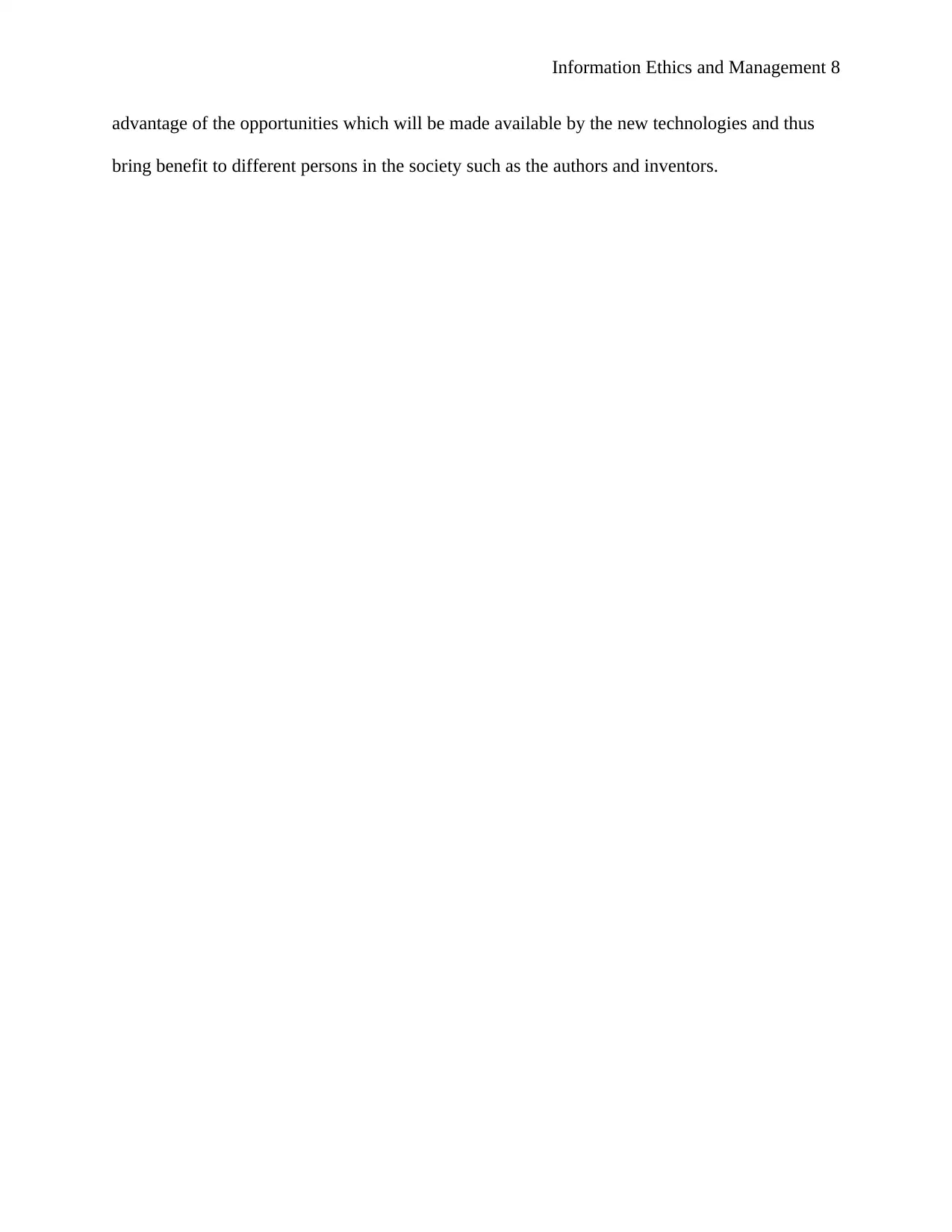
Information Ethics and Management 8
advantage of the opportunities which will be made available by the new technologies and thus
bring benefit to different persons in the society such as the authors and inventors.
advantage of the opportunities which will be made available by the new technologies and thus
bring benefit to different persons in the society such as the authors and inventors.
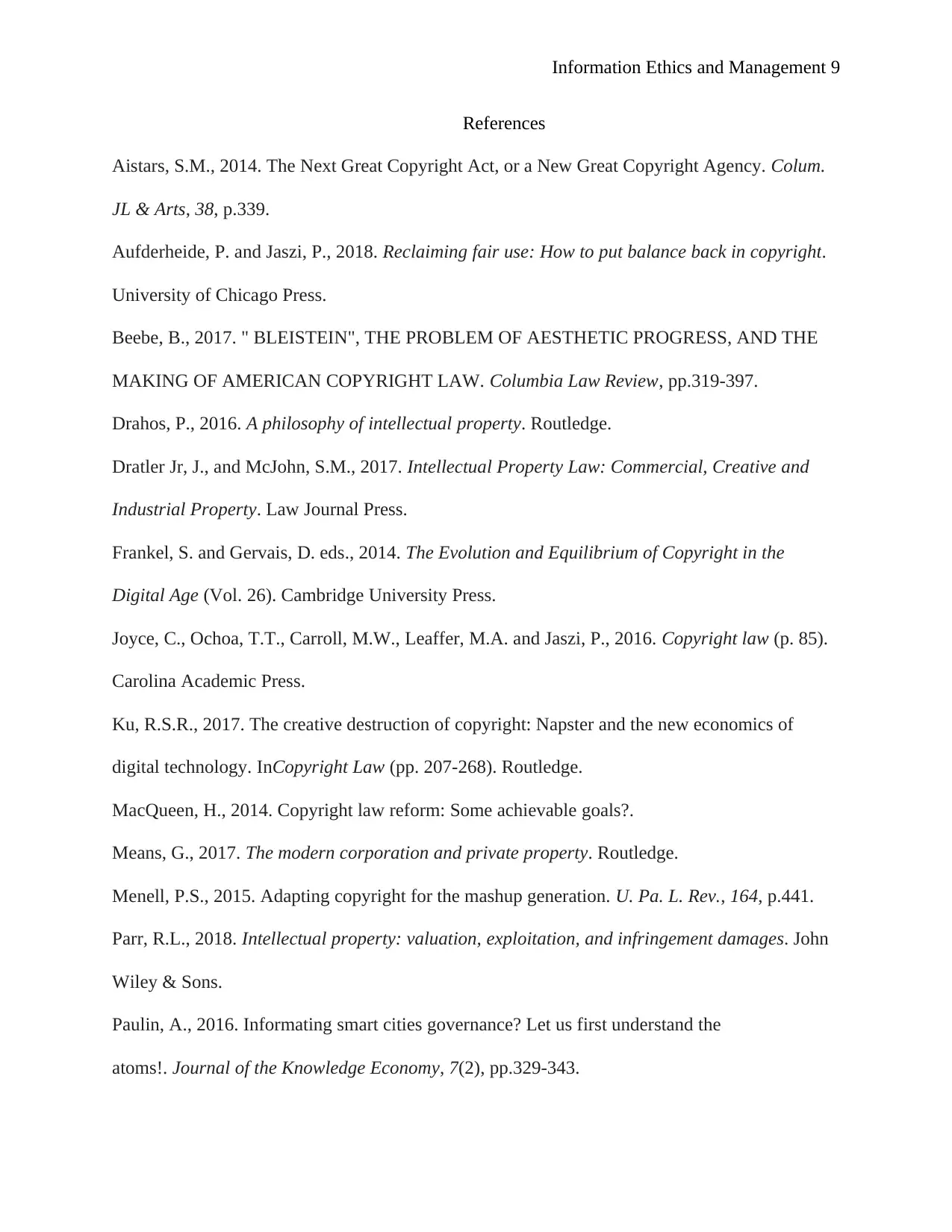
Information Ethics and Management 9
References
Aistars, S.M., 2014. The Next Great Copyright Act, or a New Great Copyright Agency. Colum.
JL & Arts, 38, p.339.
Aufderheide, P. and Jaszi, P., 2018. Reclaiming fair use: How to put balance back in copyright.
University of Chicago Press.
Beebe, B., 2017. " BLEISTEIN", THE PROBLEM OF AESTHETIC PROGRESS, AND THE
MAKING OF AMERICAN COPYRIGHT LAW. Columbia Law Review, pp.319-397.
Drahos, P., 2016. A philosophy of intellectual property. Routledge.
Dratler Jr, J., and McJohn, S.M., 2017. Intellectual Property Law: Commercial, Creative and
Industrial Property. Law Journal Press.
Frankel, S. and Gervais, D. eds., 2014. The Evolution and Equilibrium of Copyright in the
Digital Age (Vol. 26). Cambridge University Press.
Joyce, C., Ochoa, T.T., Carroll, M.W., Leaffer, M.A. and Jaszi, P., 2016. Copyright law (p. 85).
Carolina Academic Press.
Ku, R.S.R., 2017. The creative destruction of copyright: Napster and the new economics of
digital technology. InCopyright Law (pp. 207-268). Routledge.
MacQueen, H., 2014. Copyright law reform: Some achievable goals?.
Means, G., 2017. The modern corporation and private property. Routledge.
Menell, P.S., 2015. Adapting copyright for the mashup generation. U. Pa. L. Rev., 164, p.441.
Parr, R.L., 2018. Intellectual property: valuation, exploitation, and infringement damages. John
Wiley & Sons.
Paulin, A., 2016. Informating smart cities governance? Let us first understand the
atoms!. Journal of the Knowledge Economy, 7(2), pp.329-343.
References
Aistars, S.M., 2014. The Next Great Copyright Act, or a New Great Copyright Agency. Colum.
JL & Arts, 38, p.339.
Aufderheide, P. and Jaszi, P., 2018. Reclaiming fair use: How to put balance back in copyright.
University of Chicago Press.
Beebe, B., 2017. " BLEISTEIN", THE PROBLEM OF AESTHETIC PROGRESS, AND THE
MAKING OF AMERICAN COPYRIGHT LAW. Columbia Law Review, pp.319-397.
Drahos, P., 2016. A philosophy of intellectual property. Routledge.
Dratler Jr, J., and McJohn, S.M., 2017. Intellectual Property Law: Commercial, Creative and
Industrial Property. Law Journal Press.
Frankel, S. and Gervais, D. eds., 2014. The Evolution and Equilibrium of Copyright in the
Digital Age (Vol. 26). Cambridge University Press.
Joyce, C., Ochoa, T.T., Carroll, M.W., Leaffer, M.A. and Jaszi, P., 2016. Copyright law (p. 85).
Carolina Academic Press.
Ku, R.S.R., 2017. The creative destruction of copyright: Napster and the new economics of
digital technology. InCopyright Law (pp. 207-268). Routledge.
MacQueen, H., 2014. Copyright law reform: Some achievable goals?.
Means, G., 2017. The modern corporation and private property. Routledge.
Menell, P.S., 2015. Adapting copyright for the mashup generation. U. Pa. L. Rev., 164, p.441.
Parr, R.L., 2018. Intellectual property: valuation, exploitation, and infringement damages. John
Wiley & Sons.
Paulin, A., 2016. Informating smart cities governance? Let us first understand the
atoms!. Journal of the Knowledge Economy, 7(2), pp.329-343.
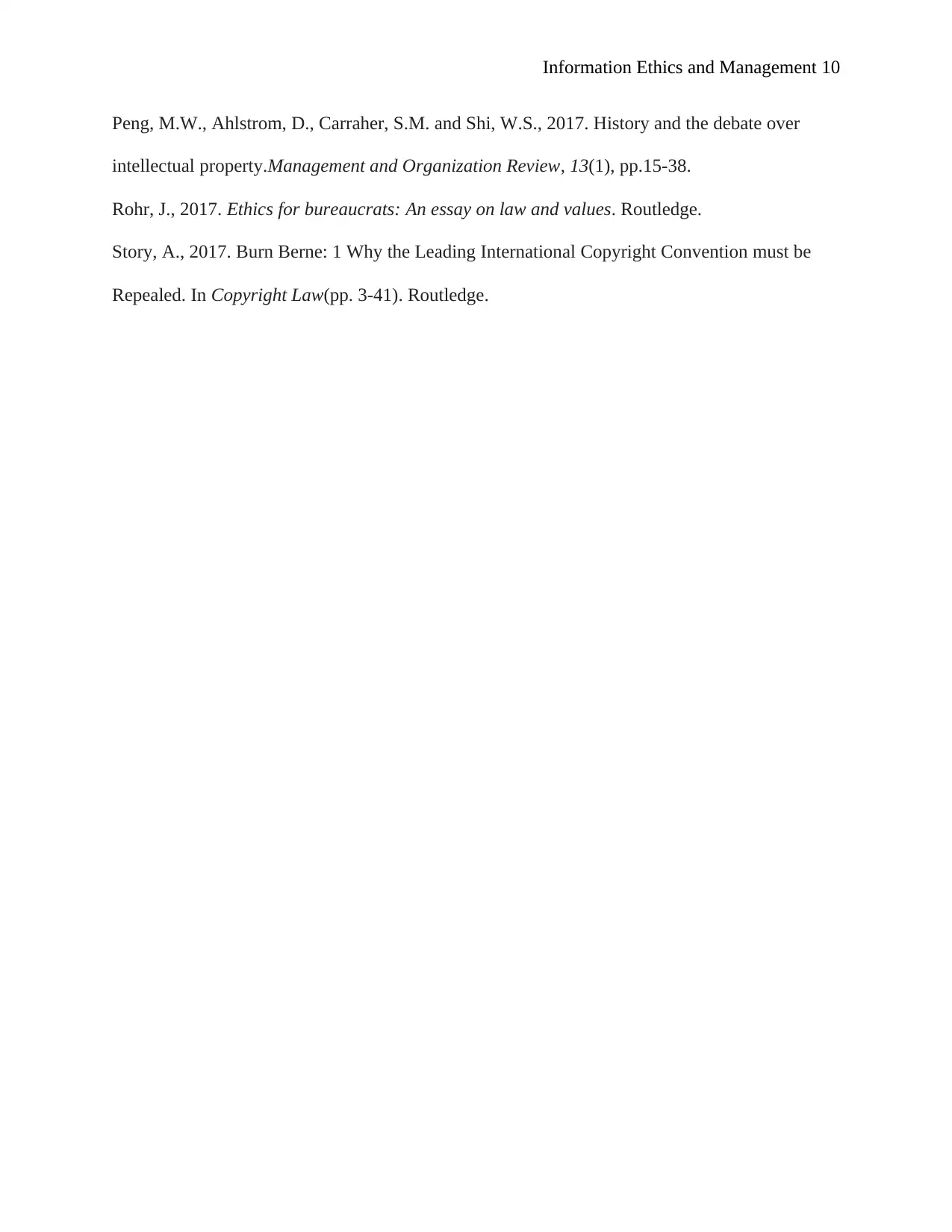
Information Ethics and Management 10
Peng, M.W., Ahlstrom, D., Carraher, S.M. and Shi, W.S., 2017. History and the debate over
intellectual property.Management and Organization Review, 13(1), pp.15-38.
Rohr, J., 2017. Ethics for bureaucrats: An essay on law and values. Routledge.
Story, A., 2017. Burn Berne: 1 Why the Leading International Copyright Convention must be
Repealed. In Copyright Law(pp. 3-41). Routledge.
Peng, M.W., Ahlstrom, D., Carraher, S.M. and Shi, W.S., 2017. History and the debate over
intellectual property.Management and Organization Review, 13(1), pp.15-38.
Rohr, J., 2017. Ethics for bureaucrats: An essay on law and values. Routledge.
Story, A., 2017. Burn Berne: 1 Why the Leading International Copyright Convention must be
Repealed. In Copyright Law(pp. 3-41). Routledge.
1 out of 10
Related Documents
Your All-in-One AI-Powered Toolkit for Academic Success.
+13062052269
info@desklib.com
Available 24*7 on WhatsApp / Email
![[object Object]](/_next/static/media/star-bottom.7253800d.svg)
Unlock your academic potential
© 2024 | Zucol Services PVT LTD | All rights reserved.




